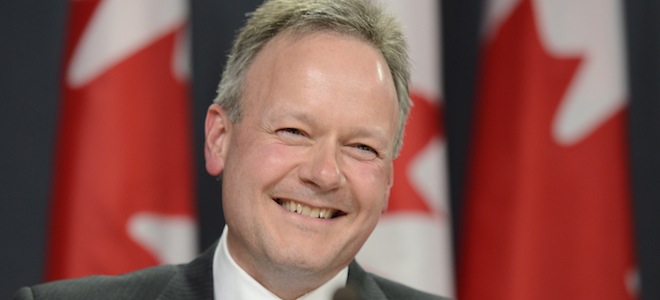A first assessment of Stephen Poloz
A review of the Bank of Canada governor’s first hearing before the Standing Committee on Finance
Bank of Canada Governor designate Stephen Poloz walks with outgoing Governor Mark Carney as they make their way to a news conference in Ottawa, Thursday May 2, 2013. THE CANADIAN PRESS/Adrian Wyld
Share

Walking away from the Standing Committee on Finance (FINA) this morning after his first hearing there as the new Bank of Canada governor, Stephen Poloz must have made a mental note never again to use a WWII metaphor before the House of Commons. “This is not a recovery in the usual sense,” the governor noted in prepared remarks for his opening speech before FINA, “It’s more like a postwar reconstruction.” All the governor meant by that, he later clarified, was that the latest recession had wiped out entire companies, and bringing output and employment levels to where they once were requires creating new firms from the ground up. That’s what the governor had dubbed “reconstruction,” as opposed to firms boosting production and hiring, which is all that’s normally required in a textbook-case economic recovery.
MPs, though, had spotted the headline-worthy quote in the governor’s speech and intended to run with it. If we’re in a sort of post-war reconstruction mode, asked NDP MP Raymond Cote, “should we take a more interventionist approach?” And if the governor sees a parallel between with the post-war reconstruction effort, which was led by the manufacturing sector, asked Liberal MP Scott Brison, where does that leave commodities? You get the idea.
Anyways, aside from that, here’s what the governor said today, in a nutshell:
- On interest rates: The governor distanced himself from a report by Export Development Canada, which he used to head, which stated that a softer loonie would help Canadian exports. On the other hand, the governor also refused to embrace a recent paper by the C.D. Howe Institute, which argued for an interest rate hike and listed a series of nefarious effects associated with keeping rates low for too long. “We knew well before this paper that there were these risks,” the governor said, adding that the Bank’s interest rate decision involves “a more complex tradeoff than is implicated by that analysis.” He described the current environment as “low-for-hopefully-not-too-long-rates.”
- On manufacturing: “I don’t discount the manufacturing sector,” the governor said, adding that he’d seen reports suggesting that “manufacturing is flourishing.”
- On the Dutch Disease: “I certainly don’t describe what we have today as anything remotely like that,” the governor said in reference to a column he penned in 2005 in which he diagnosed Canada as suffering from the affliction. The Dutch Disease argument is that the high loonie, pumped up by commodities prices, harms the manufacturing sector and causes dangerous imbalances between the economies of Eastern Canada and the country’s resource-rich West. However, Poloz also noted today that Canada’s ability to adjust to those regional imbalances has improved.
- On exports: If trade happened in the solar system, the governor ventured with another metaphor that proved much less controversial, most of the business would happen with between the two biggest planets, Jupiter and Saturn, which are rather close to each other and very far from Earth. That’s what the future of global trade looks like seen from Canada right now: The bulk of it will increasingly be South-South trade between emerging economies that don’t have much of a connection to us. International agreements with the trade superpowers of the future are essential to enable Canadian firms to grow their business in those corners of the world that are slated to see most of the action.
- On household debt: It would “certainly” make the list of the biggest risks facing the economy, Poloz said. The governor, however, declined to provide MPs with a ranking of those biggest risks (it is his fourth day on the job). Poloz also cautioned against comparing current household indebtedness with debt levels typically held by previous generations, saying that Canadian families nowadays might owe a lot but also own more assets.
- On the housing market: Poloz praised Finance Minister Jim Flaherty for tightening mortgage rules and described managing Canada’s frothy housing market as a team effort between the BoC, the government and various government finance watchdogs.
- On “dead money:” Former Bank of Canada Governor Mark Carney, who’d criticized Canadian companies for sitting on “dead money,” rather than investing it, had declared such money “resurrected” before the end of his term, the current governor noted when NDP MP Peggy Nash brought up the topic. “Companies in Canada have healthy balance sheets,” Poloz said, adding that “the preconditions for greater activity with that money are emerging.”
- On Japan: The governor, like his predecessor, takes a positive view of “Abenomics,” the super-stimulative policies embraced by Japan’s Prime Minister Shinzo Abe in attempt to dig the country out of decades of stagnation. Japan is a “pretty significant” trading partner, Poloz noted, but Abenomics’ effects on output and incomes will be more important than its effects on the yen. (A little background here: Japan’s extra-loose monetary policy is causing the yen to depreciate, making Canadian exports less competitive. On the other hand, they’re also expected to help Japan return to economic growth, which would increase its demand for Canadian goods and services.)